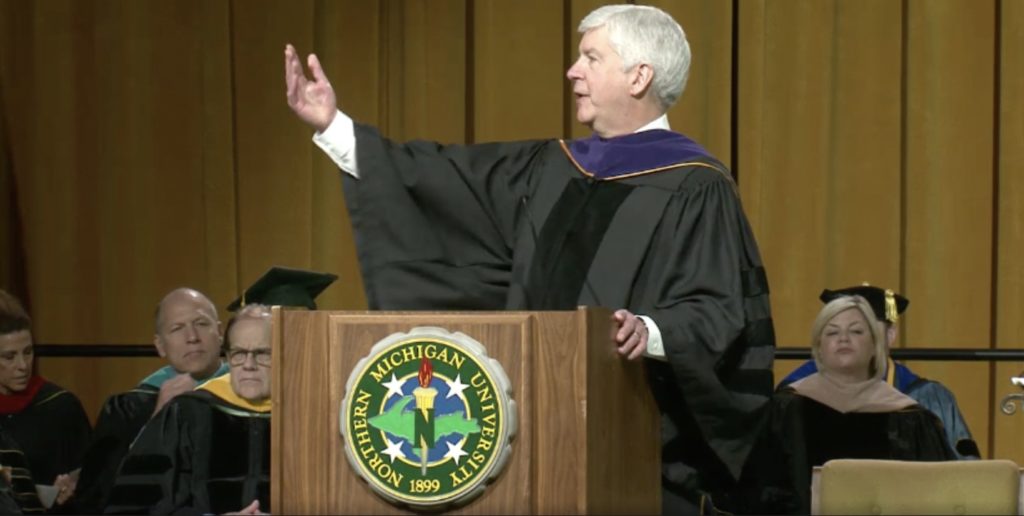Hundreds of Northern Michigan University’s students are now alumni as of May 5, when its annual commencement ceremony filled the Superior Dome with students, family, faculty, staff and protests against Gov. Rick Snyder, the 2018 distinguished guest speaker.
Before 10:30 a.m. when the ceremony took place, protesters stood on the lawn in front of the entrance to the dome holding signs that read “water for people, not corporations;” “tax Nestle now;” and “oil [and] H2o don’t mix, neither should lead [and] H2o.” Other protestors were participating in a drum circle, which could be heard from the street. “This was a decision that was made against the wishes of some of the faculty and some of the students, and because of that, I feel that [Snyder] shouldn’t be welcome here,” said protestor Craig Bengry of Escanaba.
Snyder’s invitation as commencement speaker was mired in controversy over the Flint water crisis, which began in 2014 when the city switched its water supply, leading to over 100,000 residents being exposed to high levels of lead in their drinking water. Bengry said people need to stop looking away from the issue, and understand that Flint still doesn’t have clean drinking water.

He added that Nestle is taking water for “next to nothing,” and the state’s priorities need to be turned around.
“I really think that we couldn’t be more proactive by standing here, and people can’t look around us,” he said. “To walk up and hear the drum circle was really empowering.”
Bengry said people walked up and told the protesters to find something better to do.
“I couldn’t think of anything better to do,” he said. The invitation of Snyder immediately sparked a student petition that garnered over 400 signatures, 116 of which were from seniors, in late November. Nathan Frischkorn, who graduated in May with bachelor’s degrees in environmental science and sociology, lead the petition and presented it to the Board of Trustees on Dec. 15, 2017.
“While I understand that commencement is a sacred ceremony for the students and faculty, it is important to hold those in positions of power accountable for their actions,” Frischkorn said in an email to The North Wind after the ceremony.
People shouldn’t forget that Snyder was responsible for appointing the emergency management that caused the Flint water crisis, and therefore “is ultimately responsible,” Frischkorn said.
“He has also tried to evade all responsibility for the crisis, spending taxpayer dollars on his personal legal defense. Almost a dozen people died, an entire generation has been poisoned, and fetal deaths have skyrocketed as a result of the crisis,” he said. “As governor of the state of Michigan, this happened on Snyder’s watch, and his response was an abysmal failure and an abdication of responsibility. He is responsible for the poisoning of an entire city full of Americans and Michiganders.”
Frischkorn, along with 5o 75 students and audience members, protested during commencement by standing up and turning his back to Snyder during his commencement speech.
“Obviously I wish that more people had joined, but I understand that it is difficult to do something against established norms, even for people who are sympathetic to the reasons that we protested,” he said. “I am incredibly proud and grateful for everyone who did join in.”
On May 7, President Fritz Erickson sent out a campus-wide email expressing his thanks for the behavior of those who participated in the peaceful protest.
“We set the example of how civil discord, even to the point of protests, can take place with respect and care for one another,” Erickson wrote. He noted that he received numerous comments and emails about those who were impressed with the students’ expression during commencement.
“I am especially proud of the thought and work that the student protesters put into making their voices heard while still being considerate of their fellow students and the families attending commencement,” Erickson wrote.
He noted that he received numerous comments and emails about those who were impressed with the students’ expression during commencement.
“I am especially proud of the thought and work that the student protesters put into making their voices heard while still being considerate of their fellow students and the families attending commencement,” Erickson wrote. “Throughout the process we collectively—students, faculty, staff and administrators—kept talking, listening and working with each other to find ways for varying points of views to be expressed and heard.”






























